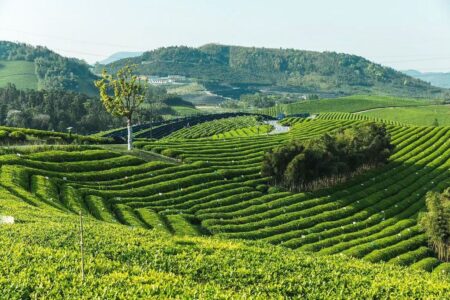Achieving responsible coffee sourcing

Image: Starbucks Coffee
Although the concept of responsible sourcing to benefit coffee farmers remains high, the actual practice appears to still be low. A 2021 report finds that the coffee industry has failed at lifting producer incomes and developing new efforts to achieve a living income for all producers. By Shem Oirere
Responsible coffee sourcing is critical in effectively addressing widespread poverty among smallholder coffee producers and farm workers with coffee companies expected to pursue favourable practices such as pricing as well as technical and financial support to the producers.
A July 2021 report by Columbia Center on Sustainable Investment, a joint center of Columbia Law School and Columbia Climate School at Columbia University in New York, says the low coffee prices for the 2017-2019 period brought to the fore ”how the coffee sector has failed at lifting producer incomes and set in motion new efforts to achieve a living income for all producers.”
“Despite the many responsible sourcing efforts in the coffee industry, trends illustrate the continued disconnect between procurement priorities and sustainability commitments within many companies and within the sector at large,” the report says. It defines responsible sourcing as “decisions and actions related to procurement of coffee beans that enables economically, socially, and environmentally sustainable production, including producer and farmworker well-being.”
The report, titled “Responsible Coffee Sourcing: Towards a Living Income for Producers”, shows that in a sample of ten coffee producers, only in two, Brazil and Vietnam, do farmers earn income that is above poverty line. The international poverty line has been put at USD $2.15, $3.65 and $6.85 for low income, low-middle-income and upper-middle-income countries respectively.
In the other eight countries the average income is below the poverty line. The ten countries analysed in the Columbia report have an estimated 89 percent of global coffee exports and 62 percent of producers globally.
Brazil, which is projected to report a 2.4 million bags decline in coffee exports to 36.65 million bags in the 2022/23, is the only country among the ten analyzed in the report where the average coffee farmer earns a net coffee income that is above some living income estimates.
East Africa’s leading coffee producer Uganda was listed among countries with the largest gap to living income, with the report estimating average earnings from coffee by farmers at $88 annually relative to living income reference values that range from over $2,000 to nearly $6,000.
The report attributes the huge gaps in achieving living income for coffee producers to two emerging trends including the transfer of risk to coffee producers away from other supply chain actors as well as removing roasters and retailers from the sphere of sustainable production by confining it to the farm level. The report identifies company sourcing practices as being “a critical part of closing the living income gap for producers and ensuring living wages for farmworkers.”
Coffee companies either active or that source their coffee from the 12.5 million coffee producers in the more than 30 producing countries, are at different levels of achieving full responsible sourcing practices with the International Coffee Organization (ICO) saying the firms and other actors have an opportunity to “develop more direct, transparent and stable commercial relationships with suppliers that reward good performance (such as quality and sustainability) with price incentives and responsible sourcing practices (such as contract and payment terms).”
However, the ICO says despite “existing sustainability claims and initiatives, suppliers (coffee farmers) often cannot meet their cost of production or living.”
Interest vs practice
Dublin, Ireland-based multinational taste and nutrition company Kerry Group, said the concept of responsible coffee sourcing “is not yet very widespread.” However, Kerry’s own previous research findings “continuously show an overwhelming consumer interest in supporting sustainability initiatives” according to Coralie Garcia-Perrin, global marketing director for taste at Kerry Group.
The company, which celebrated its 50th anniversary last year along with a 19.3 percent increase in revenues to €8.8 billion ($11.058 billion), has committed to have its coffee suppliers “farm for a long time, receive a good return for their coffee and that their farming local community is maintained and thrives with their coffee sales and exports,” according to Garcia-Perrin.
“Kerry is focused on developing high-value extracts from coffee sourced from our suppliers under the Café Femenino programme,” she said. “Since 2003, the Café Femenino coffee program has been an ethical sourcing model committed to ending the cycle of poverty affecting women coffee farmers around the world.”
The Café Femenino programme is operational in Peru, Indonesia, Brazil, Guatemala, Nicaragua, Bolivia, Mexico, Colombia and Rwanda. Under the programme, which was co-founded by Peruvian women farmers alongside Organic Products Trading Company, more than 4000 women coffee farmers are reaping the benefits of ethical sourcing practices.
“Café Femenino provides direct compensation to women farmers for their coffee beans, along with the opportunity and resources to enact positive change in their communities and on their own terms,” Garcia-Perrin said. Through Café Femenino’s efforts, subscribed women coffee farmers “receive payments and payment premiums directly, and assume leadership roles, such as in co-op voting and on boards.” The members also secure rights to the land they farm to produce Fair Trade Certified and organic-certified coffees.
Finding gaps in the approach
The Columbia Institute Centre report analyses several other coffee companies’ approach to responsible sourcing including Nestlé, JDE Peet’s, Smucker, Starbucks, Lavazza, Tchibo, Keurig, Costco, Tata, and Unilever. The evaluation exposed huge disparities in their programmes especially when it comes to pricing, traceability and support for coffee producers.
“While all of the companies have established sustainability commitments or projects relevant to producers, none are able to guarantee that all viable producers in their supply chains earn a living income,” the report says. Some of the areas the companies need to do more include committing to have long-term contracts with coffee producers and ensuring the price coffee farmers receive “commensurate with the Living Income Reference Price or even better.”
Moreover, gaps emerged when it came to tracking of prices or premium offers to ensure coffee producers received them especially for coffee that has been certified or verified as responsibly sourced according to the report. When it came to cost-plus margins, the report says there is lack of transparency by coffee companies that have specialised programmes.
However, Starbucks, the Seattle, Washington-based multinational chain of coffeehouses and Reserve Roasteries that has been ranked the world’s largest coffeehouse chain, says on its website it takes “a holistic approach to ethically sourcing coffee through responsible purchasing practices, farmer loans and forest conservation programs.”
“When we buy coffee this way, it helps foster a better future for farmers and a more stable climate for the planet, and it helps create a long-term supply of the high-quality beans we’ve been carefully blending, roasting and packing fresh for more than forty years,” it says.
Starbucks, which by 2021 had 33,833 stores in 80 countries, credits Conservation International, a nonprofit environmental organisation based in Virginia, for the buying guidelines, dubbed Coffee and Farmer Equity (C.A.F.E.) Practices, which the company uses to address ethical coffee sourcing.
Most coffee producers, says Rainforest Alliance (RA) in a February 2023 statement, have “little to no power in negotiating prices, terms of trade, and the additional resources required for sustainable production.” RA says coffee producers bear most of the risks, burden of compliance, and impacts of climate change, yet only a small part of the value of certification reaches them.
RA, an international non-profit organisation working at the intersection of business, agriculture, and forests to promote responsible business practices, had previously included ‘shared responsibility’ in its 2020 Sustainable Agriculture Standard for the purpose of “addressing inequity in global supply chains.” Through the shared responsbility concept, RA has pledged its support in addressing existing constraints facing farmers by ensuring they are rewarded for their sustainability efforts and that the “costs of investments in more sustainable farms and production are shared between farmers and companies.”
Although RAs uses Rainforest Alliance Certification Program “to drive more economic transparency and steer more resources to farmers,” the Columbia Centre report identifies shortcomings on the contribution of the voluntary sustainability standards (VSS) used in coffee towards achieving living income and wages. Living income has been described as the net earnings necessary for a coffee producer to afford a decent living depending on where one lives while living wage is payment needed to enable employed farm workers afford a decent living standard and is usually higher compared to the minimum wage in a specified place.
“VSS are not sufficient to significantly improve producer income or to enable them to achieve a living income,” the report says. It argues that the VSS does “not benefit the poorest producers, and that much of the additional retail costs of certified products are captured by roasters and retailers, rather than producers.”
Apart from the Rainforest Alliance other leading external third-party VSS in the global coffee industry include Fairtrade and 4C. There are also verifications that offer second party assurance in the industry including SMS Verified, Enveritas Gold, NKG Bloom, and AtSource.
Ensuring commitments
Responsible coffee sourcing would require the commitment of all actors in the coffee value chain with coffee companies taking a lead role.
“It implies building partnerships across supply chains in which the terms of trade and price match the objective of increasing the profitability and sustainability of coffee production,” says the ICO in another report, further noting, “this match could mean less dependence on the commodity markets (de-commoditisation) and that the prices and premiums paid are informed by cost of production, living income or living wage benchmarks.”
Kerry Group’s Garcia-Perrin said coffee companies can drive responsible sourcing by “committing to fair pricing and making commitments to support the environment around coffee farms and helping [farmers develop] a sustainable living community.” A key aspect, she added, “is committing contractually to compensate farmers over an extended period of time hence providing a measure of stability to allow the farmers and their communities to plan for the future.”
The discussion around responsible coffee sourcing comes at a time when the performance of global coffee market is improving despite a slight dip in production. Although world coffee production declined by 1.4 percent to 168.5 million bags in coffee year 2021/22, consumption rose 4.2 percent to 175.6 million bags for the same period. Consumption is expected to reach 178.5 million bags in coffee year 2022/23.
How increased export sales and consumption volumes translates into a better living income for coffee producers and living wage for farm workers continues to ignite debate among coffee industry actors in nearly all the 30 coffee producing countries.
- Shem Oirere is a freelance business journalist based in Nairobi, Kenya. He has spent more than 25 years covering various sectors of Africa’s economy including the region’s agribusiness. He holds BA in International Relations and Diplomacy from the University of South Africa and earned a higher degree in journalism from the London School of Journalism and is also a member of the Association of Business Executives (ABE).



